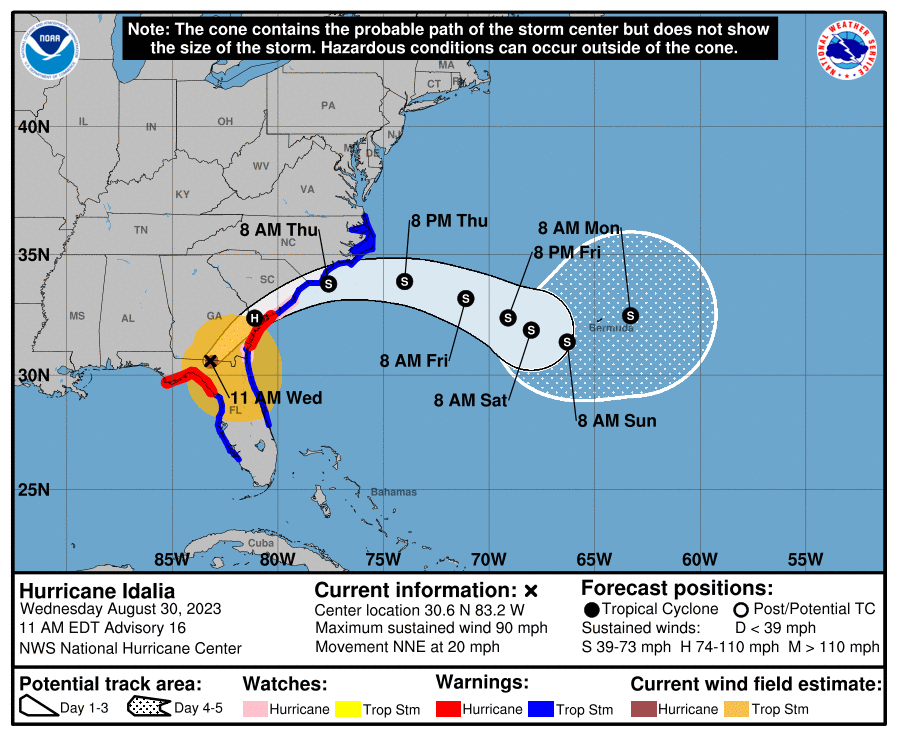Just ahead of Hurricane Idalia’s Florida landfall Wednesday morning, the executive director of ALAN – the logistics relief organization – sent out some guidance for trucking and logistics companies looking to help with what will undoubtedly be a significant recovery operation.
Kathy Fulton shared five pre-storm takeaways that “we feel [are] especially essential for organizations to be aware of.”
The storm, which made landfall as a Category 3 hurricane, is expected to cross the state and impact Georgia and possibly the Carolinas as it heads into the Atlantic Ocean. Potential forecast tracks have it meandering in the Atlantic for several days before possibly looping back toward the East Coast as a weakened system next week.
ALAN offers several resources, Fulton shared, including its Supply Chain Intelligence Center and Disaster Micro-Site. Both sites are updated frequently. The first contains a wide variety of resources to keep logistics companies in the loop about everything from Hurricane Idalia’s latest path to how local and regional transportation infrastructure is being impacted. The second is where details about some of ALAN’s key activities and how logistics companies and other members of the logistics community can help.
Below are ALAN’s 5 takeaways for businesses:
1.Don’t put your head in the sand. Make personal safety a priority.
If you or some of your business locations are located anywhere near Hurricane Idalia’s path, be sure to monitor the National Hurricane Center and your local National Weather Service forecast for real-time details. And please, don’t ignore any safety warnings that pertain to you or your personnel. This is expected to be a major hurricane with winds of up to 120 miles per hour as well as a massive storm surge and potential for flooding, which means its potential impact is not to be taken lightly. In light of this, please ensure that your employees who work in potentially affected locations have ample time to prepare, shelter in place or evacuate as needed – even if it means closing those operations early or telling employees not to report to work.
2. Stay up to date
Get the latest detailed information about storm-related road closures, facility closures and more by visiting ALAN’s Supply Chain Intelligence Center.
It should tell you most of what you need to know. But should you wind up needing additional information, please contact ALAN at [email protected].
3. Disaster requests incoming
ALAN is actively fielding and fulfilling Hurricane Idalia and other major disaster relief requests (including many from the Maui fires). You can view the latest by going to the “What’s The Latest And How Can You Help With Relief Efforts?” section on the Disaster Micro-Site.
Over the past few weeks, ALAN said it has been communicating with various emergency management and non-profit partners regarding their hurricane needs. Although there are no “open” requests for Hurricane Idalia support at the moment (although there are many more from other disasters) this situation could quickly change as Hurricane Idalia’s story unfolds. In fact, most requests usually come several days or weeks after hurricanes have hit. So stay tuned and stay ready – because as requests for transportation, warehousing, volunteers and material handling equipment come in, ALAN will be posting them promptly.
4. Pre-offer space, equipment or services
If you’d like to “pre-offer” your space, equipment, expertise or services, please visit https://www.alanaid.org/how-to-help/ on the ALAN website to fill out a form.
Such offers to be hugely helpful because it lets us know who might be most willing to help out with ALAN’s most urgent needs. ALAN said it knows a pre-offer is not a promise and it will still reach out to ask if you’re willing to help with a particular need rather than just assuming you will.
5. Don’t self-deploy to disaster-impacted sites, and please don’t participate in product collection drives
Although the intention behind both of these activities is good, they often create more challenges than they solve, because they tend to get in the way of responders who are working to save lives – and add confusion to an emergency supply chain that is already under tremendous strain. If you’re looking for a meaningful way to help, pick a humanitarian organization and collect money for it instead. Such donations will be much more useful and efficient – and far more likely to actually reach storm survivors.
SC
MR


Latest Supply Chain News
Latest Podcast

 Explore
Explore
Business Management News
- Strengthening customer fulfillment: Building a strategic stakeholder network
- The hard job of teaching soft skills
- Trump picks former Wisconsin congressman Sean Duffy for DOT secretary
- Made in Mexico, manufactured by China
- Retail sales see gains in October, reports Commerce and NRF
- Balancing green and speed: Home delivery insights from the pandemic era
- More Business Management
Latest Business Management Resources

Subscribe

Supply Chain Management Review delivers the best industry content.

Editors’ Picks




